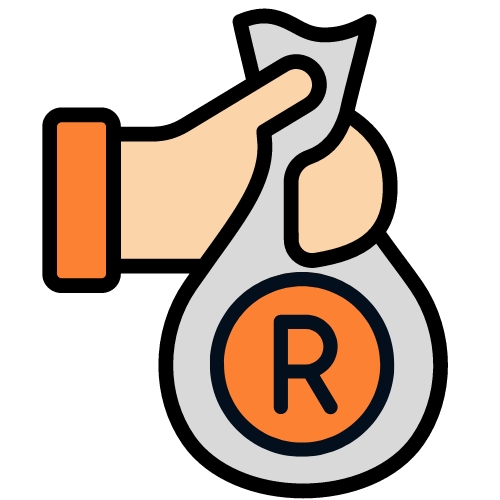
Even with the best intentions, many South African investors make costly errors that can limit the growth of their portfolios or expose them to unnecessary risk. Whether it’s placing too much capital into a single asset, choosing products that don’t suit their financial goals, or being swayed by short-term market noise, these missteps can undermine long-term outcomes.
Key Takeaways
- Avoid Overconcentration: Many South Africans risk their financial stability by investing too heavily in one asset, such as property or tech shares. A well-diversified portfolio helps reduce exposure to market volatility.
- Match Investments to Your Goals: Choosing products that don’t align with your objectives, timeline, or risk appetite can undermine returns. Understand the restrictions, tax rules, and accessibility of each investment option before committing.
- High Fees Hurt Long-Term Growth: Investment returns are diminished by excessive charges. Always review the effective annual cost (EAC) and consider switching to lower-fee providers if necessary.
About Arcadia Finance
Arcadia Finance makes getting a loan simple. Skip the fees, compare offers from 19 trusted NCR-compliant lenders, and enjoy a fast, secure service.
Why Should You Consider Investing?
Many South Africans choose to invest so they can afford major purchases in future, maintain financial comfort after retirement, and grow their money over time. By investing, your money has the potential to earn returns through interest or the increase in value of assets you hold and sell at a later stage.

Getting Started with Investing
Here is a straightforward guide to help you take the first steps.
Define Your Investment Objectives
Before investing, identify what you’re saving for. List your personal and financial goals, especially those that involve significant expenses, such as buying a home or funding education. Use a timeline to organise your goals into short, medium, and long-term priorities.
Understand the Types of Investments
It’s useful to know the basic types of investment products: shares, bonds, and unit trusts.
- Shares: Buying shares means you own a portion of a company. If the company grows and performs well, the value of your shares may increase. You can sell them for a profit, assuming the business does not face serious issues like insolvency.
- Bonds: A bond is a loan you make to a company or government. The issuer agrees to repay the full loan on a set date and pay you regular interest in the meantime. The interest is fixed, based on an agreed rate.
- Unit Trusts: These pool funds from many investors. A fund manager uses the combined money to invest in a range of assets such as shares and property. Some unit trusts spread risk across different sectors, while others focus on specific industries. Portfolio managers handle the buying and selling within the fund.
Understand Basic Investment Strategies
Familiarise yourself with how the stock market operates and common investment approaches. You may hear advice to focus on shares, but this market can be unpredictable, with both sharp drops and gains.
Investing directly in shares can involve high risk. Choose an option that aligns with your risk tolerance and goals. A registered financial adviser can help explain your choices clearly. If you prefer to learn more on your own, consider listening to an introductory podcast on stock investing.
Build a Balanced Investment Portfolio
Your portfolio includes all your holdings such as shares, bonds, and unit trusts. Diversification is essential. By spreading your investments across various sectors, you reduce the chance of large losses from one poor-performing asset. A well-diversified portfolio balances risk and provides more stable performance over time. Avoid concentrating your investments too narrowly in one area.

Common Errors South African Investors Make

Putting Too Much Capital in One Place
It’s important to examine the overall structure of your assets and liabilities. Where is the bulk of your capital held? Many South Africans are still paying off a home loan, which means a significant portion of their wealth is invested in property. If, on top of this, you’ve also committed most of your remaining savings or discretionary investments to a second property or a handful of technology shares, you are placing yourself in a high-risk position with limited diversification.
An often-overlooked risk is placing money in different investment products that are effectively exposed to the same underlying assets. For example, if you are contributing to a retirement annuity that is heavily weighted toward local equities, and your tax-free savings account is similarly structured, your overall portfolio may end up overexposed to the South African market. This kind of duplication increases your vulnerability to local market downturns. You might also be overly concentrated in a specific industry, such as technology, or heavily invested in growth assets like equities that may not match your personal investment timeline.
A more balanced approach would be to consider multi-asset funds that diversify across sectors, geographies, and asset types. These funds typically follow an index-tracking strategy and avoid excessive exposure to individual companies, which helps manage risk more effectively.

Choosing the Wrong Investment Product
A common mistake involves selecting investment products that do not match your financial objectives, appetite for risk, or investment timeframe. Some investors also misjudge the impact of legislative limits or tax considerations attached to these products.
Take, for instance, a scenario where you have surplus funds each month and opt to place them into a fixed-term bank deposit. While this approach feels secure, the long-term returns may be minimal. A low-cost, equity-based exchange-traded fund (ETF) within a tax-free savings account may offer stronger long-term growth, despite the misleading name suggesting it is merely a savings product.
However, tax-free savings accounts come with restrictions. The current annual contribution cap is R36 000, with a lifetime limit of R500 000. Withdrawals cannot be replenished. If you contribute R100 000 over several years and then withdraw the full amount, you can only invest a further R400 000 across your lifetime. This could limit long-term growth potential if not carefully planned.
Retirement annuities also have specific characteristics. Contributions to these are typically locked in until at least the age of 55, apart from certain limited withdrawals permitted under the two-pot system. While this can work well for long-term retirement planning, it limits accessibility. However, the benefits include a reduction in taxable income and protection from creditors. In contrast, unit trusts provide greater flexibility with contributions and withdrawals, but you will be liable for taxes on gains and income. Knowing how these products complement each other can help shape a more effective long-term strategy.

Working With a High-Cost Provider
Investment success depends greatly on the ability of your money to grow through compound interest. High fees erode that growth over time, especially when paired with poor-performing investment options.
A seemingly small 1% increase in annual fees can reduce your retirement savings by as much as 30% over time. Traditional retirement annuities, for instance, have historically been burdened by excessive fees without delivering sufficient performance to justify the cost. The combination of weak returns and high charges undermines your investment outcomes.
To assess whether your current investment provider is offering fair value, request the effective annual cost (EAC) of your products. There are calculators available that allow you to compare costs across different providers. These tools can help you determine whether you are receiving a reasonable return for the fees charged.

Investing Based on Emotion
Humans are not always rational investors. Decisions are often influenced by emotions like fear, greed, or the urge to follow current trends. Emotional decision-making can lead to poor outcomes, especially when people try to chase the next big thing without a solid plan.
Headlines about major companies reaching extraordinary valuations can create pressure to react. But short-term hype should not drive your investment choices. Instead, understanding and applying sound investment principles is more reliable. These include:
- Time in the market matters more than trying to time the market
- Index-tracking strategies frequently outperform actively managed funds over the long term
- Lower fees result in better net outcomes
- Markets fluctuate, but long-term growth is a recurring pattern
- Choose financial products that suit your income level, goals, and life stage
- Create a structured plan, follow it, and review it regularly

Failing to Prioritise Retirement Planning
Investing in individual stocks or speculative assets such as cryptocurrency or niche investments may be interesting, but it rarely outperforms a diversified, low-cost strategy over the long term. For most people, retirement planning should come first before considering any speculative investments.
The first step is to build a solid foundation. This means contributing consistently to a retirement annuity, especially if your employer does not offer a pension or provident fund. It also means maintaining a reliable emergency fund to cover unexpected expenses without disrupting your investment plan.
Once your retirement plan and emergency reserves are in place, you may consider other vehicles like tax-free savings accounts or unit trusts. Only after establishing these core elements should you look at higher-risk investments.
Preparing for the future is not just about choosing investments that seem exciting. It’s about ensuring that your long-term financial wellbeing is protected through structured, well-considered decisions.

Best Investment Options in South Africa
| Investment Option | Description |
|---|---|
| Tax-Free Savings Accounts (TFSA) | Tax-Free Savings Accounts are well-suited for those building savings over time. These accounts allow individuals to grow their money without paying tax on interest, dividends, or capital gains, as permitted by the South African Revenue Service (SARS). |
| Fixed Deposits | Fixed deposit investments offer a guaranteed interest rate for a set term, making them a reliable choice for those who prefer predictable returns and low exposure to risk. |
| Interest-Bearing Flexible Savings Accounts | These accounts offer the benefit of earning interest while still allowing free access to your money. While they provide greater liquidity than fixed deposits, the interest rates are generally lower in exchange for that flexibility. |
| Money Market Funds | Money market funds are considered a low-risk, short-term investment option. They work similarly to flexible savings accounts but may offer slightly higher interest rates, depending on the provider. Some level of risk does apply, although it remains conservative. |
| Unit Trusts | Unit trusts allow investors to contribute funds to a collective investment scheme, which is actively managed by professionals. The portfolio is diversified to reduce risk and may include various assets such as shares, bonds, and cash instruments. |
| Mutual Funds | Mutual funds operate in much the same way as unit trusts but often include a wider variety of assets, such as offshore investments, to spread risk across different markets. |
| Exchange Traded Funds (ETFs) | ETFs are investment funds that track an index, commodity, or group of assets, and are bought and sold on the stock exchange. They provide exposure to market performance with typically lower fees than actively managed funds. |
| Stocks | Investing in stocks means purchasing shares in listed companies. While this approach offers the potential for strong returns, it also comes with higher risk, especially in volatile market conditions. |
| Government Bonds | Government bonds are fixed-income investments where individuals lend money to the state under predefined terms. These bonds are considered secure and low-risk, as they are backed by the national government, and provide interest income over time. |
| Property | Investing in property involves buying residential or commercial real estate. This can generate rental income and offers the potential for capital growth if property values increase. Investors also benefit from having a tangible asset in their portfolio. |
| Retirement Annuity (RA) | A Retirement Annuity is a long-term savings product designed for retirement planning, offering tax advantages and helping to ensure financial stability during retirement years. |
Conclusion
Investing is a valuable way for South Africans to build long-term financial security, but common mistakes can erode growth and limit success. Issues such as poor diversification, mismatched products, high fees, emotional decisions, and neglecting retirement planning often undermine investor outcomes. A more effective approach involves choosing investments that suit your goals, maintaining a balanced portfolio, keeping costs low, and sticking to a disciplined plan. By focusing on long-term strategy rather than short-term trends, you can improve the chances of reaching your financial objectives.
Frequently Asked Questions
Many investors put too much money into a single asset or sector, such as property or local equities, without proper diversification. This increases risk and can result in larger losses during market downturns.
Ask your provider for the Effective Annual Cost (EAC) of your investment products. Use available comparison tools to see if your fees are competitive and whether you’re receiving value for the cost.
Fixed deposits offer guaranteed returns and low risk but limited growth. Unit trusts may offer higher returns over time but come with more risk. Choose based on your financial goals and risk tolerance.
Tax-free savings accounts allow your returns to grow without tax, but they have annual and lifetime contribution limits. They work well for long-term growth when used within those limits.
The earlier the better. Starting early gives your investments more time to grow and reduces the amount you need to contribute each month. If your employer doesn’t offer a pension, consider a retirement annuity.
Fast, uncomplicated, and trustworthy loan comparisons
At Arcadia Finance, you can compare loan offers from multiple lenders with no obligation and free of charge. Get a clear overview of your options and choose the best deal for you.
Fill out our form today to easily compare interest rates from 19 banks and find the right loan for you.

